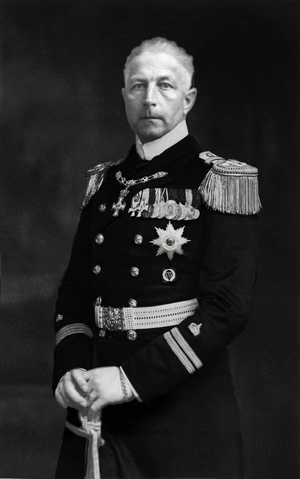Henry II, German Emperor
| Henry II | |
|---|---|
 | |
| German Emperor King of Prussia | |
| Reign | 14 November 1978 - present |
| Predecessor | Sigismund |
| Chancellors | See list |
| Born | Prince Sigismund Henry of Prussia 22 June 1922 Berlin Palace, Berlin, German Empire |
| Spouse | Princess Ragnhild of Norway (m. 1952) |
| Issue | |
| House | Hohenzollern |
| Father | Sigismund, German Emperor |
| Mother | Princess Charlotte of Saxe-Altenburg |
| Religion | Lutheranism |
Henry II (Sigismund Henry; born 22 June 1922), or Heinrich II is the reigning German Emperor and King of Prussia. Having inherited both the Prussian and imperial thrones upon the death of his father, Sigismund, he currently presides over the German Empire as a semi-constitutional monarch and has largely retained his predecessors' stance on maintaining Germany's position as a powerful, but otherwise non-aligned state standing in the middle of the capitalist and communist blocs amidst the ongoing Cold War conflict.
Born in June 1922, Henry was the second but oldest male child of Sigismund, German Crown Prince and Princess Charlotte of Saxe-Altenburg. Upon reaching adulthood, he largely followed in his ancestors' footsteps of serving in a branch of the Imperial German Forces, namely in the Imperial German Navy, where prior to his ascension to the throne, he developed a reputation in the navy as an accomplished and exemplary officer, thereby allowing him to reach the rank of Admiral by the end of his active service in the navy. Meanwhile, in 1952, he married Princess Ragnhild of Norway, the eldest child of King Olav V of Norway, with whom he has two children, Otto, German Crown Prince and Prince William.
At the age of fifty-six, following the death of his father, Henry ascended to both the Prussian and imperial thrones, thereby becoming the fifth overall German Emperor and the eleventh King of Prussia. As German Emperor, he is the head of the empire's many federated monarchs, all of whom, despite largely retaining their long-held autonomy are ultimately subordinate to the German Emperor himself.
With the overthrow and subsequent assassination of Emperor Haile Selassie of Ethiopia in 1974, Henry is therefore considered to be one of the two remaining emperors in the world alongside Emperor Hirohito of Japan. On the other hand, the manner of his reign has made the German Emperor a subject of frequent comparisons between himself and the likes of Sheikh Zayed bin Sultan Al Nahyan of the United Arab Emirates and Sultan Yahya Petra of Kelantan, both of whom, much like Henry himself, are simultaneously the crowned heads of their respective states and of their respective nations as a whole, with the sole difference being that unlike both of them, the title of German Emperor is otherwise passed on in a hereditary manner and not by an election among the nation's many monarchs.